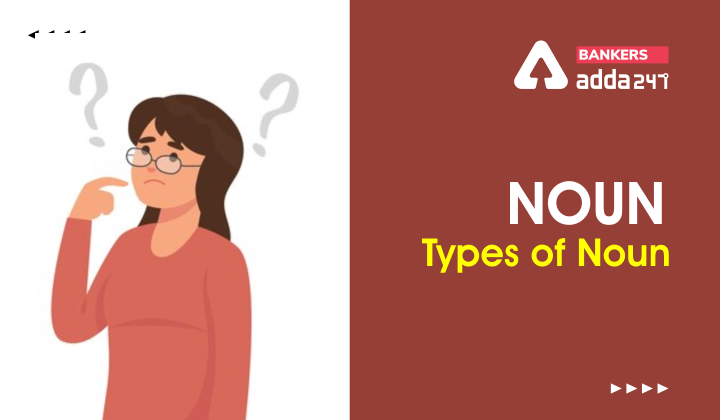Table of Contents
Introduction of Noun: Nouns are naming words. Everything we see or talk about is a noun. A noun is a word that refers to a person, place, things, animals, or qualities. In a sentence, nouns can play the role of the subject, direct object, object complement, appositive, or adjective. Here are some examples of nouns.
- All you need is love.
- We must use this time wisely.
- Seema has a lot of homework to do this evening.
- My keyboard is sticky.
- Can I pet your dog?
- Please pass the salt.
Types of Nouns: Examples & Rules
We all know there are many different types of mango (rose-red, Gulab Khas, Sindhura, parrot beak-shaped Totapuri). Each kind of mango tastes a bit different, but each is still a mango. Nouns are similar, only they don’t taste as good. Whichever type you’re dealing with has its own characteristics, but it will still be a noun. There are a number of different categories of nouns. Candidates can check the types of nouns with examples below.
- Proper Noun
- Common Noun
- Collective Noun
- Concrete Noun (or Material Noun)
- Abstract Noun
- Possessive Noun
- Number Noun
- Compound Noun
- Countable Noun
- Uncountable Noun (or Mass Noun)
- Masculine Noun
- Feminine Noun
| Types of Nouns | Examples |
| Proper Noun: In English, proper nouns normally name specific people, places, things, and ideas. Like months, days, events, religious names, places, buildings, structures, names of people, titles, etc. | United Nations, Olympic Games, August, Tuesday, Coca-Cola, New Year’s Eve, Hinduism, miss Sharma, World War II, etc. |
| Common Noun: A common noun is a noun that denotes any or all of class of entities and not an individual. Like the generic name for a person, place, class, group, etc. | Chid, city, day, students, teacher, women, man, minister, etc. |
| Collective Noun: Collective nouns are also called a group of nouns. A name or noun used for a group of people, things, or a group of animals is called a collective noun. Like committee, family, team, crowd, army | Group of people, Group of students, Group of lions, Group of sailors, etc
|
| Concrete Noun: Concrete nouns are the nouns that can be felt through our five senses such as smell, touch, hearing, and taste. | smell, touch, hearing, and taste, flowers, tables, songs, sweets, etc. |
| Abstract Noun: This noun refers to the name of a quality, action, or state that cannot be experienced with the five senses. | Calmness, Coldness, Brilliance, Charity, Compassion. |
| Possessive Noun: A possessive noun is a noun that is commonly defined as a person, place, thing, or idea. Nouns become possessive once they changed to show ownership. | My brother’s pen, ram’s house, mine, ours, yours |
| Countable Noun: Countable nouns are for things we can count using numbers. These are individual people, animals, places, or ideas that can be counted. They have a singular and a plural form. | Dog, cat, man, bottle, fork, chair, bag, cup, plate, box, animal, coin, etc. |
| Uncountable Noun: Uncountable nouns are not individual objects, so they cannot be counted | Stars, water, milk, rice, butter, |
| Masculine Noun: Masculine nouns refer to words for a male figure or male members. A noun that denotes a male person or animal is said to be of the masculine gender. | Boy, male, actor, horse, king, bull, |
| Material Noun: Material Nouns refer to a material or substance from which things are made such as silver, gold, cotton, etc. |
Gold, silver, coal, sunlight, wood, sand, air, protein, iron, cotton, diamond, plastic, etc. |
| Feminine Noun: feminine nouns refer to words for female or female members. A noun that denotes a male person or animal is said to be of the feminine gender. | Girl, female, actress, queen, women, etc. |
Some Questions Based on Nouns
Directions: Read each sentence to find out whether there is any grammatical error in it. The error, if any part of the sentence. The number of that part is the answer. If there is no error, the answer is 4 no error.
- Jaya Jyotsana went (1)/ to her friends house(2)/ and gave her two ten rupees note(3)/ No error.
- There was (1)/ no money in the bank in Dhananjay’s(2)/ and Mritunjay’s joint account(3)/ No error.
- Mr. Sharma is one of the(1)/ best teacher (2)/ in our school (3)/ No error.
- The table’s legs (1)/ have been (20)/ elaborately carved (3)/ No error.
- The Machineries are (1)/ not functioning properly (2)/ these days(3)/ No error.
- Nobody’s claim to be a permanent member(1)/ of club is valid(2)/ in the eyes of the committee(3)/ No error.
- I postponed him going to Delhi tonight as (1)/ I wanted him to deal with (2)/ one of my major problems (3)/ No error
- One of the important lesson (1)/ he taught me was to save (2)/ at least thirty percent of my gross income(3)/ No error
- All the child playing (1)/ at the beach ran towards sam when (2) / they heard him shout (3)/ No error.
- Cattles are(1)/ not allowed to (2)/ enter this place (3)/ No error.
Solutions:
- (3) Use ten-rupee note in place of ten-rupees note.
- (2) Use Dhananjay in place of Dhananjay’s
- (2) Use teachers in place of teacher.
- (1) Use the leg of the table in place of the table’s legs.
- (1) Use the machinery is in place of the machineries are because machinery is an uncountable noun.
- (4) No Error.
- (2) Use his in place of him
- (1) Use lessons in place of lesson.
- (1) Use all the children in place of all the child.
- (1) Use cattle in place of cattles.
FAQs: Types of Nouns
Q1. Give some examples of collective nouns which have been used both in singular or plural forms?
Ans. Collective nouns are always used in both plural and singular forms. like public, team, committee, orchestra, audience, company, jury, government, etc.
Q2. What is a proper noun?
Ans. Proper nouns normally name specific people, places, things, and ideas. Like months, days, events, religious names, places, buildings, structures, names of people, titles, etc.
Q3. What is a collective noun?
Ans. Collective nouns are also called a group of nouns. A name or noun used for a group of people, things, or a group of animals is called a collective noun. Like committee, family, team, crowd, army
Q4. What are different types of nouns?
Ans. Candidates can check all types of nouns in the given article.
Q5. What are Nouns?
Ans. A noun is a word that refers to a person, place, things, animals, or qualities.
Q6. What is some example of countable nouns?
Ans. There are some examples of countable nouns like Dog, cat, man, bottle, fork, chair, bag, cup, plate, box, animal, coin, etc.
Q7. What is an example of Material Noun?
Ans. Gold, silver, coal, sunlight, wood, sand, air, protein, iron, cotton, diamond, plastic, etc. are examples of Material nouns.





 GA Capsule for SBI Clerk Mains 2025, Dow...
GA Capsule for SBI Clerk Mains 2025, Dow...
 The Hindu Review October 2022: Download ...
The Hindu Review October 2022: Download ...
 SBI Clerk Prelims Result 2025 Out, SBI J...
SBI Clerk Prelims Result 2025 Out, SBI J...




